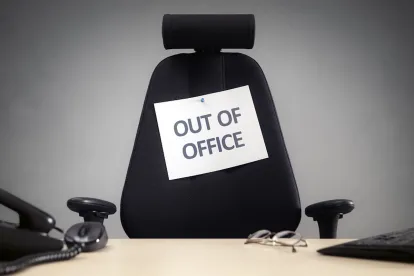On March 13, 2023, Illinois Governor J.B. Pritzker signed the Paid Leave for All Workers Act (the “Act”) into law.
When the Act takes effect on January 1, 2024, eligible employees will be entitled to earn 40 hours of paid leave for every 12-month period at a rate of one hour for every 40 hours worked and will be able to use their accrued paid leave for any purpose—employers cannot require employees to submit documentation or other proof in support of the leave request.
Who Will Be Covered?
The Act states that it does not apply to employers already covered by any county or municipal ordinance that requires them to provide paid leave of any kind, including paid sick leave. Accordingly, those employers already covered under City of Chicago and Cook County ordinances would not be subject to the Act. Despite this and other carveouts (see the exceptions discussed below), the statute contains a broad definition of employers covered by the Act, including all private employers and most state and local government units, excluding only school districts and park districts. Likewise, most “employees” are covered, including domestic workers, but excluding a few specific categories, such as rail and air carrier employees as well as part-time student employees or short-term workers at colleges and universities. Entitlement to accrual and usage of paid leave is explicitly created for any “employee who works in Illinois.” Accordingly, the Act’s application relies on the location of the employee, not the employer, which has clear implications for employers with remote workers who may live (and work) in Illinois, even if the employer has no other presence in the state.
What Will (and Won’t) Be Required?
Paid Leave Accrual & Usage
Covered employees start accruing paid leave at a minimum rate of one hour for every 40 hours worked when the Act takes effect on January 1, 2024, or upon commencement of employment, whichever is later. Overtime-exempt employees paid on a salary basis will be entitled to an accrual of one hour per workweek unless their regular workweek is shorter than 40 hours. The statute provides that Illinois employees are entitled to earn and use up to “a minimum of 40 hours” or, if they work less than 40 hours a week, “a pro rata number of hours” of paid leave during a 12-month period. Employers may, but are not required to, permit more than 40 hours to accrue annually. Moreover, an employer that provides paid leave that is equal to, or more generous than, the Act’s provisions is not required to modify that policy as long as it comports with the principle that paid leave may be taken for any reason.
Employees will be able to start using accrued paid leave 90 days after the Act takes effect (or 90 days after commencing employment, whichever is later) and will not have to provide their employer a reason for the leave.
Employers will not be allowed to request or demand documentation, certification, or any other proof or support for the leave but may determine the reasonable minimum increment for the use of paid leave, not to exceed two hours per day. The statute also calls for employers to create “reasonable paid leave notification requirements” and specifies the following rules:
-
Employers will be permitted to require employees to give up to seven days’ notice for foreseeably needed leave.
-
Where a need for paid leave is not foreseeable, employees will be expected to provide notice “as soon as is practicable after the employee is aware of the necessity of the leave …,” pursuant to their employer’s procedures as specified in a written policy.
-
An employer must notify its employees of any change to its “reasonable paid leave policy notification requirements” at least five days prior to implementing the change, in writing.
-
An employer may not require its employees taking paid leave to search for or find a replacement worker to cover their hours.
Employees taking leave under the Act will be entitled to compensation at their hourly rate of pay unless they normally work at a reduced wage in light of anticipated gratuities and commissions. Such workers must be paid at least the full minimum wage applicable in their jurisdiction. Employers must provide employees accrued paid leave upon receiving an oral or written request from employees and must maintain health coverage for employees during the leave.
Carryover and Payouts: It’s Complicated!
The Act requires that accruals not used by an employee must carry over annually, even though employers will not be required to allow more than 40 hours of paid leave per year unless they choose to do so. However, employers can avoid this carryover requirement by frontloading the full amount of an employee’s anticipated paid leave accruals at the start of the year, which can be any 12-month period of the employer’s choosing. In such cases, employers may impose a “use it or lose it” policy, requiring employees to forfeit any accruals that remain unused within the year. This suggests that employers should consider whether any risk inherent to frontloading paid leave is offset by the advantage of simplified recordkeeping from year to year.
Another question employers will have to consider is how the Act affects rules regarding final compensation, including those imposed by the Illinois Wage Payment and Collection Act. Although the Act contains a provision stating that nothing in the Act or in “any other Illinois law or rule shall be construed as requiring” that unused accrued paid leave under the Act be paid out to employees upon their termination, resignation, retirement, or other separation from employment, the Act also provides that (1) accruals must be maintained for employees who are transferred but remain employed by the same employer and (2) any individual who is separated from an employer but then rehired by that employer within 12 months is entitled to all unused paid leave that had accrued prior to the separation.
Moreover, although the Act states that paid leave “shall not be charged or otherwise credited” to a paid time off bank or employee account, it also contemplates that some employer policies permit such credits. If such is the case, unused credits would be payable as part of an employee’s final payout upon departure from the employer. As to final compensation rights, any changes to an employer’s treatment of vacation and other paid time off, including paid leave for any reason, must be explained by the employer in a written notice. Given the potential for confusion about departing employees’ entitlement to compensation for paid leave accruals, employers should consider their written policies and practices carefully.
More Tasks for Covered Employers
The Act contains a robust section on “related employer responsibilities” that includes recordkeeping and notice requirements. For at least three years, employers are required to maintain records of employees’ hours worked, paid leave accruals, and paid leave usage. In addition, the Act includes detailed notice requirements, both with respect to notifying individual employees about their accruals and with regard to inclusion of an official notice about employee rights under the Act within an employee handbook or manual as well as at the workplace, in a conspicuous place where such information is typically posted. Employers can be liable for a $500 civil penalty for failing to meet these notice requirements, with subsequent notice violations subject to a $1,000 civil penalty.
Exceptions and Enforcement Considerations
The Act specifies that it is not intended to interfere with any valid collective bargaining agreement and that the rights offered under the Act may be validly waived in a bona fide collective bargaining agreement, provided that a waiver is presented with clear and unambiguous language. However, the Act also provides that individual employees are not permitted to waive their rights under the Act; such agreements would be void as against public policy.
Employers are subject to civil penalties under the Act. In addition, the Act prohibits retaliation and permits aggrieved parties to seek relief through administrative claims with the Illinois Department of Labor (IDOL), including actual damages, compensatory damages, and penalties of $500 – $1,000.
What’s Next?
The Act directs IDOL to create a poster that describes employer obligations and employee rights under the Act, which will need to be displayed at workplaces by January 1, 2024. The agency may develop additional regulations or guidance to assist employers with compliance as well.
What Employers Should Do Now
Employers with employees in Illinois should determine whether the Act applies to them. Remember, those employers subject to other paid leave laws, such as the paid sick leave mandates in Cook County and/or the City of Chicago, are not required to provide paid leave for any reason. Employers that are covered by the Act should take steps to comply by preparing to:
-
provide their employees with the required written notice of the Act that will be provided by IDOL by January 1, 2024;
-
modify any existing paid leave policies as necessary to comply with the Act before January 1, 2024;
-
preserve records documenting hours worked, the amount of paid leave accrued and taken, and the remaining paid leave balance for each employee for a minimum of three years;
-
train managers and/or human resources personnel about the administration of paid leave; and
-
pay attention to any further guidance issued by IDOL.




 />i
/>i
